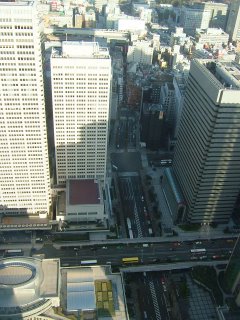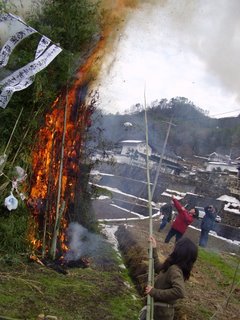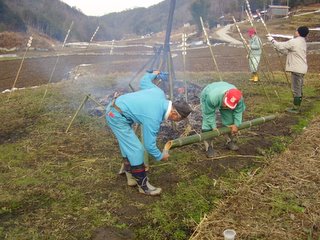The Big Smoke
Over the weekend I swapped the crisp, clear air of the Hiroshima countryside for the smog, grime and filth of the nation's capital. When in Tokyo, you feel that breathing may actually be detrimental to your health. Pores become clogged, fingernails gather dirt at an alarming rate, and you feel as if you're a 60-a-day Benson & Hedges man.
But I love visiting the capital. From the Hiroshima countryside it is a journey of 414 miles by air. It takes just over an hour but it is as close to time travel as I have experienced. The countryside you leave behind is, without doubt, still marooned somewhere in the 20th century - arrive in Tokyo and you find yourself firmly in the 21st. You leave as an exotic curiosity to all those around you, and arrive as anonymous as any other face in the crowd.
On a Tokyo trip, I can play at being a tourist - an oft-forgotten luxury in a country in which I have spent almost half my life. On my last trip I visited Yasukuni Shrine at dusk. In the half-light it is as powerfully atmospheric and eerie as it is controversial. This time I was taken to Tokyo's Twin Towers, otherwise known as the Tokyo Metropolitan Government Buildings.
 Planned in the "financial bubble", and completed after it had burst, rumour has it that the buildings' electricity bills alone are bleeding the city dry. Just looking up at the South Tower is enough to make a hick from the country dizzy. Look down and, well, the whole world starts spinning.
Planned in the "financial bubble", and completed after it had burst, rumour has it that the buildings' electricity bills alone are bleeding the city dry. Just looking up at the South Tower is enough to make a hick from the country dizzy. Look down and, well, the whole world starts spinning.

The views from the 45th floor are wonderful and I highly recommend a trip.
It is another world in Tokyo - inhabited by a completely different race of people. Tokyo is more than two hundred times larger than the small country town in which I live. Tokyo is neon, noise and bustle. Miyoshi has the odd patch of neon, I guess; for noise we have to make do with the primordial screeching of rogue cats on heat. But bustle? We don't go in for that in any shape or form.
Not many Tokyoites would want to spend too much time here, what with the restaurant choices being limited to ramen or ramen. But many of the locals don't care too much for the big smoke either - one young woman, born and bred here in the sticks, said she wouldn't give the time of day to any man from Tokyo, "They all speak funny and they're so effeminate. Give me a real Hiroshima man anyday."
In Tokyo, I feel like a country bumpkin chewing on his stem of straw. I stare around me at the throngs of people, stare upwards at shiny buildings that go on for ever, and just stare. In Tokyo, the shoe is on the other foot. I do the staring, and nobody pays a blind bit of notice to me. It's great for a change.
But I love visiting the capital. From the Hiroshima countryside it is a journey of 414 miles by air. It takes just over an hour but it is as close to time travel as I have experienced. The countryside you leave behind is, without doubt, still marooned somewhere in the 20th century - arrive in Tokyo and you find yourself firmly in the 21st. You leave as an exotic curiosity to all those around you, and arrive as anonymous as any other face in the crowd.
On a Tokyo trip, I can play at being a tourist - an oft-forgotten luxury in a country in which I have spent almost half my life. On my last trip I visited Yasukuni Shrine at dusk. In the half-light it is as powerfully atmospheric and eerie as it is controversial. This time I was taken to Tokyo's Twin Towers, otherwise known as the Tokyo Metropolitan Government Buildings.
 Planned in the "financial bubble", and completed after it had burst, rumour has it that the buildings' electricity bills alone are bleeding the city dry. Just looking up at the South Tower is enough to make a hick from the country dizzy. Look down and, well, the whole world starts spinning.
Planned in the "financial bubble", and completed after it had burst, rumour has it that the buildings' electricity bills alone are bleeding the city dry. Just looking up at the South Tower is enough to make a hick from the country dizzy. Look down and, well, the whole world starts spinning.
The views from the 45th floor are wonderful and I highly recommend a trip.
It is another world in Tokyo - inhabited by a completely different race of people. Tokyo is more than two hundred times larger than the small country town in which I live. Tokyo is neon, noise and bustle. Miyoshi has the odd patch of neon, I guess; for noise we have to make do with the primordial screeching of rogue cats on heat. But bustle? We don't go in for that in any shape or form.
Not many Tokyoites would want to spend too much time here, what with the restaurant choices being limited to ramen or ramen. But many of the locals don't care too much for the big smoke either - one young woman, born and bred here in the sticks, said she wouldn't give the time of day to any man from Tokyo, "They all speak funny and they're so effeminate. Give me a real Hiroshima man anyday."
In Tokyo, I feel like a country bumpkin chewing on his stem of straw. I stare around me at the throngs of people, stare upwards at shiny buildings that go on for ever, and just stare. In Tokyo, the shoe is on the other foot. I do the staring, and nobody pays a blind bit of notice to me. It's great for a change.










